Get Lazy to Get Tough
Apr 6, 2016
My approach to mental toughness emphasizes working with what our brain instinctively and naturally wants to do. I show clients how to take advantage of our brain’s innate inclinations and, often, I make them do stuff that goes against convention.
Take being lazy, for example. Many clients are surprised when I strongly suggest they be lazy or do absolutely nothing for a while. I’m not talking about a 10-15 minute break, because everyone gets that idea. No, I’m talking about taking a whole afternoon or evening off to do nothing, or a whole day if they can manage it.
 We have been socially programmed to think laziness is bad when, in fact, our brains instinctively need it. Why? Because the brain strives to conserve energy and carry out tasks in the easiest and most efficient way possible. That means doing something, especially difficult tasks like performing under pressure, is best achieved when the brain is rested and fresh and replenished, not when it’s stressed and tired and grumpy.
We have been socially programmed to think laziness is bad when, in fact, our brains instinctively need it. Why? Because the brain strives to conserve energy and carry out tasks in the easiest and most efficient way possible. That means doing something, especially difficult tasks like performing under pressure, is best achieved when the brain is rested and fresh and replenished, not when it’s stressed and tired and grumpy.
When I present this idea, my clients provide three telling reactions. The first is that they don’t have time. Oh, the irony! The second is that they’ve never done it. Fair enough, that’s what I’m here for. The third is that they are extremely uncomfortable with the concept. Like a lot of people in our multi-tasking world, they believe they should go-go-go all the time and if they aren’t burning the candle at three ends they are somehow lazy, unmotivated, undedicated, or lesser than. I say, “Balderdash!” and then I explain why being lazy is vital to the human condition and important for superb mental toughness.
A large part of becoming mentally tough and tougher is being so supremely confident in yourself and your abilities that you can enjoy significant idleness without compromising your competitive edge or breaking any absurd fallacies about dedication or motivation. You have to believe in what you have and being lazy forces you to build that belief. If you feel taking several hours off will somehow ruin your next elite level competition, then you are not properly prepared for it anyway. At the elite level, weeks and months make the difference, not mere hours.
The psychological and emotional benefits of being idle and staring wistfully upon scenic vistas or taking naps are enhancements to mood, memory and alertness, all of which contribute to top-notch competitive performances. Regardless of wins or losses or progress or setbacks, the overall effect of being strategically lazy is an elite competitor who is happier, more at ease with the world, and who has increased feelings of self-worth and self-control.
From a mental toughness perspective, I want competitors to be purposefully lazy because it increases their ability to endure frustration and better manage their emotions when the breaks go against them or an official or judge gets it wrong. Mentally rested competitors are better at thinking through complex situations and fast-changing conditions and they’re also better at not reacting impulsively. Most important, these competitors are better able to remain fully focused on the competitive task at hand when the pressure is on.
I get my clients to think of it this way: if their days are jammed full and their brains are always operating at capacity, or more in some cases, it takes very little to tip the scale and for their entire mental and emotional world to come completely unglued. Even if they are able to somehow hold it together, they will endure so much ongoing stress that their performance will be notably substandard.
I then explain how leisurely zoning out and chillin’ greatly facilitates productivity and efficacy. Competitors who design significant downtime into their regimens are more productive and effective because their brains are operating under focused-and-destressed conditions. They also prove to be mentally sharper under competitive pressure and can better handle the rigors of extended competition, such as weekend tournaments, playoffs, stressful auditions and recitals, or writing several exams in 2-3 days.
My clients learn how to make, and take, significant periods of downtime. They learn that their brain will allow them to do absolutely nothing if given the time and space. Once they “get” laziness and realize the benefits, they never want to return to their old ways.
Top 10 Strategies to Improve your Mental Edge in Golf
Mar 26, 2016
(This is an abbreviated version of my upcoming article at GolfPerform.com.)
 Many things in golf can’t be controlled or predicted but what you do mentally is not one of those things. As I say to all my clients, “You can control how and what you think 100% of the time. Do that and you’ll be mentally tougher!”
Many things in golf can’t be controlled or predicted but what you do mentally is not one of those things. As I say to all my clients, “You can control how and what you think 100% of the time. Do that and you’ll be mentally tougher!”
If you want to play better golf you need to make a few things feel like they are under control. Here’s my Top-10 Never-Never list—the 10 most easily controlled parts of golf that cause poor play. Pick one that applies to your game and implement it for all shots, then move on to another. Using these strategies will give you a significant mental edge over most other players.
NEVER-NEVER hit a shot . . .
- . . . without confidence in your yardage.
- . . . without confidence in your target.
- . . . without confidence in the club selected.
- . . . without using your pre-shot routine.
- . . . without being correctly aligned.
- . . . while thinking about your next or previous shot.
- . . . you have not recently practiced.
- . . . without completely trusting your abilities.
- . . . without being absolutely decisive about the shot.
- . . . until you are ready.
Every golfer can implement these mental-check techniques, but it takes discipline, practice and dedication. As one of my clients said, “If all I do is eliminate one of my never-never mental lapses for a round, I have won the day.”
You can read about a lot of other proven mental strategies in my new book.
Are You Letting Your Emotions Negatively Affect Your Performance?
Feb 9, 2016
If you don’t believe your emotions can have a huge impact on your competitive performance, you might as well give up competing and stop trying to get better. No, I’m not kidding. But, if you’re willing to seriously evaluate how your emotions affect you as a competitor and do something about it, read on.
We know that extremely satisfying performances are often described as the effective execution of skills and tactics while remaining composed and focused in the moment. But we also know that staying calm in the heat of competition isn’t as easy as it sounds. Competition brings pressure, both from within and from external sources. Our emotions are always in play.
Three interrelated issues regarding competitors’ emotions that need to be considered: 1) Despite being highly proficient, most elite level athletes, musicians, students and dancers do not have efficient ways to deal with powerful, split-second emotions when they arise.
1) Despite being highly proficient, most elite level athletes, musicians, students and dancers do not have efficient ways to deal with powerful, split-second emotions when they arise.
2) Most elite level competitors erroneously think they can act like a bear with a sore bum for a few moments, and then turn around and be calm enough and focused enough to properly execute their highly demanding technical skills a few moments later. Well, I have news for you: Tiger Woods is one of the few world-class performers who can actually do this, and even he can’t make it work perfectly all the time!
3) Too many elite performers think that because they are very upset about something, their emotions get unfettered permission to completely control their actions and words.
It takes enormous courage to admit that you cannot control your emotions, that these powerful emotions negatively affect your performance, and that you need to get help to correct it. Most high performers are ashamed/embarrassed that they don’t know how to handle their raw competitive emotions. In addition, people take it very personally when told to control their deeply rooted feelings (If my emotions occur naturally, why do I need to control them? Isn’t natural better?).
My fundamental message for all competitors is that you may not be able to control what happens to you during competition but you can control how you react to what happens. Ignoring your wildly up or down emotions is impossible but you can definitely learn to manage yourself in a positive manner once they happen.
I encourage all of you to learn more about these issues and, preferably, get some professional help in this area. All of the high level competitors I have worked with have won the battle with their emotions and have achieved much success, not only in the competitive realm, but in life in general.
You can learn more about how your emotions affect your performance—in golf and beyond—in my book, Golf on Auto Focus.
I’m pleased that the book is getting positive feedback from leaders in the field, such as golf journalist, Jeffrey Reed, who says:
Edmunds’ book is easily read, with a fix that is one-size-fits-all, but accommodates every unique pre-shot routine, for every level of golfer … the Auto Focus method has a lot of teeth, and should help most golfers.
Check out the full book review here.
![]()
Permission to Fail - Granted!
Jan 3, 2016
I’m unorthodox. I give my clients permission to make mistakes. By doing this, I take away a lot of the unwarranted pressure that compromises competitive performance. It’s the fear of failure that causes the most mistakes, errors, and failures in elite competitors, not the demands of the event.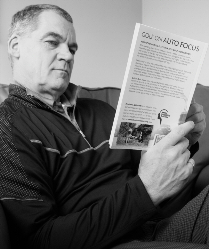 “What if I screw up, Dr. E?” they cry. I shrug, “If you are doing everything you can to be the best you can be (and that’s the only attitude I accept), then it won’t happen often. But when it happens, and it will, we’re not going to treat it like it’s the end of the world! It’s done. Over. We move forward.”
“What if I screw up, Dr. E?” they cry. I shrug, “If you are doing everything you can to be the best you can be (and that’s the only attitude I accept), then it won’t happen often. But when it happens, and it will, we’re not going to treat it like it’s the end of the world! It’s done. Over. We move forward.”
Mistakes and errors and failing to succeed or win are part of life and sport. These things will happen. Nobody’s perfect. And, this is especially true if the competitor is doing something for the first or second time, whether it’s a skill, a play, an exam, a routine or competing on the big stage. Elite competitors are so bombarded by the message that they better not screw up that they freeze, commit silly errors, or completely forget their skill set. They focus on the wrong things.
Elite athletes and high performing musicians, dancers and students are stifled by their fear of making mistakes. Rather than trying to win or perform at their very best, they are working like hell to not lose or fail. But it’s not making mistakes they’re scared of; what they’re really scared of is that someone will look down on them or mistreat them because of their mistakes. Sadly, they fear people’s reactions to their failing more than the mistake itself. They have lost total perspective.
After I give my clients my unqualified permission to fail, I teach them how to compete without fear. To never worry about failing or losing. To just do it like no one is watching. They learn to live and love the most freeing and fulfilling competitive experience ever – to compete without fear.
For the people I work with, mistakes and errors and losses are obviously not celebrated; that’s not the business we’re in. But, the reality is failures will happen. They are not the end of the world, so we don’t treat them like that, we don’t worry about them like that. Instead, mistakes and errors and losses become learning experiences and directions for corrective action. Mistakes and errors and flat out failing are many things, but they are not feared.
Strangely enough, the more my clients give themselves permission to fail, the fewer mistakes they make. Interesting!
![]()
You’re Upset? Just Forget It!
Dec 21, 2015
No matter how many times I’ve heard coaches and parents say this to an elite athlete who has suffered an emotionally devastating event, I still cringe. It is impossible to “forget it” or put it aside; our brains don’t work like that. Even if he/she could temporarily put it out of mind, I promise it will come back during the next high 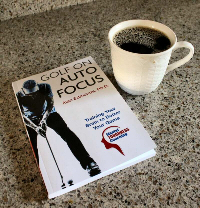 pressure situation; precisely when intense mental focus is needed. This is why so many athletes commit the same concentration or skill errors over and over; they have not trained their brains to completely remove emotionally troubling thoughts and emotions.
pressure situation; precisely when intense mental focus is needed. This is why so many athletes commit the same concentration or skill errors over and over; they have not trained their brains to completely remove emotionally troubling thoughts and emotions.
In this excerpt from my just released book, Golf on Auto Focus: Training Your Brain to Better Your Game, I describe how, Geoff, a wonderfully talented junior golfer who was on the brink of quitting, learned to properly deal with his emotions.
Rather than pretending his high emotions are not present, or ignoring or trying to forget them, he now allows himself about 20 seconds of feeling and dealing with an emotion before willing himself to stop feeling it. Geoff has been pleasantly surprised that he is able to do this. He has also learned a self-talk strategy to get himself back to his game after experiencing high emotion.
Geoff went from being despondent about his game to winning two junior club championships, having several notable performances in highly competitive junior events, and qualifying for Junior Nationals.
![]()
Golf on Auto Focus – Now Available!
Dec 6, 2015
I’m pleased to announce that my book, Golf on Auto Focus: Training Your Brain to Better Your Game, is now available in print and e-book on amazon.com and its global affiliates.
This book has been a long time coming. I actually developed and tested the Auto Focus technique a few years ago, and have used it successfully ever since with golfers in my Mental Toughness Coaching practice. At last, I have the opportunity to share Golf on Auto Focus with everyone who is as passionate about this wonderful—and frustrating—game as I am!
What’s the book about?
Quite simply, Golf on Auto Focus is about training your brain to play your best golf, more often.
Like me, most of you have probably stood in the fairway cringing as a carefully planned shot hurtled into the bushes. We’ve all lost focus—for a shot, a hole, or an entire round. If we’re lucky, that focus is back for our next outing on the links.
But what if you didn’t need luck on the golf course to be properly focused? What if your ability to focus was 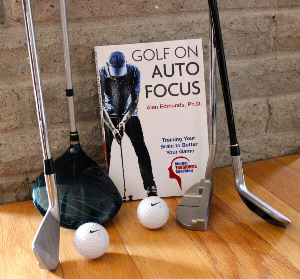 eminently reliable and consistent? With Golf on Auto Focus, that’s now within reach for golfers of all abilities.
eminently reliable and consistent? With Golf on Auto Focus, that’s now within reach for golfers of all abilities.
Having spent years on the links as a player, club-fitter, caddie, university coach, psychologist, and the father of an elite golfer, I was always puzzled by the fact that so many talented players succeeded during some rounds, and completely lost focus in others. I set out to solve the mystery of the inconsistent golf game, and discovered a place in every golfer’s swing where doubt and distraction can creep in. Auto Focus is my technique for allowing golfers to optimize their focus and improve their overall performance. My research has proven that the technique really works: Auto Focus will not only train you to focus appropriately on the right things at the right time, but also how to stop thinking and become intensely focused automatically.
Auto Focus can help you improve your focus and confidence, and exercise control over your emotions while under pressure—whether you are performing in a sports arena or a boardroom! I can’t promise miracle cures, but I can guarantee that by using Auto Focus, you will not only improve your confidence and performance, but enjoy your game more, too.
What people are saying…
If the early reviews are any indication, this book is going to make a lot of golfers very happy.
..a simple, easy to follow text that will become your own roadmap for golfing success... Dr. Alan L. Edmunds has demonstrated scientifically that with persistent and committed practice, anyone can improve their mental and physical game!
Dr. Robert K. Winters
Author of Mistake-Free Golf: First Aid for Your Golfing Brain
“Dr. Edmunds' Auto Focus approach is a brilliant and easy system to follow that allows all golfers to realize their true potential. As a coach, I see so many golfers fall short of their potential due to a lack of focus. Unlike in other golf books, Dr. Edmunds clearly identifies why we lose focus and provides clear and concise steps on how to build a strong mental focus…If you are a recreational golfer or an elite player who wants to get better, this is a must read.”
Gareth Raflewski
PGA Putting & Short Game Coach
What should I do next?
If you’re a golfer, buy the book for yourself. If you love a golfer, buy the book for them as a gift. And if you enjoy the book, please help me spread the word by sharing this blog, posting a message on social media, and of course, reviewing the book on amazon.
Learn more at www.mentaltoughnesscoaching.com
![]()
To Quit or Not to Quit
Nov 30, 2015
All my clients are high performing, competitive athletes, dancers, musicians and students. Most come to me for mental toughness training but some show up because they are on the verge of quitting. They sense failure is just around the corner and they don’t want to suffer the disappointment or embarrassment, or both.
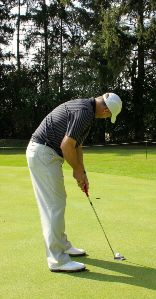 Part of the problem is we all know and celebrate high performers who have overcome adversity because they did not quit, but this simply adds to the enormous pressure my clients already feel. Oh, the guilt! As if this weren’t enough, more pressure is heaped on them because not quitting has morphed into a social and moral obligation and those who quit are perceived as lesser individuals. Sad, but very true.
Part of the problem is we all know and celebrate high performers who have overcome adversity because they did not quit, but this simply adds to the enormous pressure my clients already feel. Oh, the guilt! As if this weren’t enough, more pressure is heaped on them because not quitting has morphed into a social and moral obligation and those who quit are perceived as lesser individuals. Sad, but very true.
So, when someone who wants to quit arrives at my door, I have my work cut out for me. Using a variety of strategies over several sessions, here’s how I approached it with one of my current clients – a golfer who was so unhappy with his game that he thought his only option was to stop playing the game he loves. I immediately reassured him that he was perfectly normal. I told him that everyone thinks of quitting at some point because our psyche does not like to persistently engage in anything where a negative outcome is likely. I emphasized the psychological and emotional benefits of not quitting and downplayed any social or moral obligation.
I then showed him how to completely remove the enormous pressure he was feeling from “everybody” who he perceived was watching and evaluating him. Even though he didn’t say it, relief was written all over his face. Finally, I used his own great shots, scores, and finishes to tap into his deep emotional connection to golf. He didn’t want to quit, he just did not know how to manage his feelings about his golf performance. Over a short while he learned to replace his emotional desire to quit with a passionate promise to himself to never quit. And, he never has. Ever.
We transformed not quitting into a deep personal commitment to never quit, rather than allowing it to become a social/moral guilt trip. Ultimately, it’s all about my client’s wellbeing and happiness, not about what other people think. In an upcoming blog, I will share how I helped dedicated athletes quit their elite level sport... and feel great about it! Meanwhile, the countdown begins for the release of my new book, Golf on Auto Focus: Training Your Brain to Better Your Game. Stay tuned!
![]()
How To Live The Dream
Oct 31, 2015
One of the common problems that negatively affects young, elite level performers is that they set themselves up with unrealistic goals and expectations that are impossible to live up to. They say all the right things and have all the right posters and framed catch-phrases on their bedroom walls. But, because their vision is not  grounded, when the going gets tough or a spate of losing or failing sets in, this larger-than-life expectation now feels especially insurmountable. Giving up, thinking of quitting, or flat out quitting becomes a small and natural step. With a 24-hour per week training commitment, no one wants to constantly struggle and toil against near-certain failure.
grounded, when the going gets tough or a spate of losing or failing sets in, this larger-than-life expectation now feels especially insurmountable. Giving up, thinking of quitting, or flat out quitting becomes a small and natural step. With a 24-hour per week training commitment, no one wants to constantly struggle and toil against near-certain failure.
High performers don’t do this intentionally. They fall into the trap of latching on to huge dreams and aspirations that everyone around them insists they must have. The pressure to idolize a star and aspire to be a star is enormous. But these lofty ambitions can do more harm than good. Don’t get me wrong, I’ll never deny anyone the importance and benefits that can come from such dreams. But, it is important to differentiate between these goals and the expectations that can be worked towards on a daily basis.
My conversation with high performers experiencing this syndrome is not to deny them their vision, but to bring them back to reality. It typically goes something like this, “Your dream to be the best in the world is commendable and I sincerely hope you get there. Now, tell me what you do on a daily basis to get closer to that goal?” And, you guessed it, they typically have no concrete answers.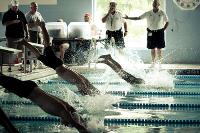 Here’s an example of a teenage swimmer who comes to me dreaming of making Canada’s national team. However, he’s terribly unhappy because he’s succumbing to the pressure of not even coming close to the required qualifying times. They seem so distant and terrifyingly fast compared to his times at the moment.
Here’s an example of a teenage swimmer who comes to me dreaming of making Canada’s national team. However, he’s terribly unhappy because he’s succumbing to the pressure of not even coming close to the required qualifying times. They seem so distant and terrifyingly fast compared to his times at the moment.
First, we keep his dream alive because, no doubt, it is highly motivational and inspirational. To keep it real, he spells out his dream in exact words and places it in a prominent place like his bedroom. Second, he breaks down the levels he has to go through to make the national team and lists the qualifying times for regional, provincial, and national standards. He sets all these to paper to act as a milestone checklist.
Third, and this is the most important part, he spells out in tangible terms, with examples, how each day’s training contributes to his ability to swim faster. This is done for all training drills/sets and dry land training for all strokes. Before he finalizes these, he consults with his coach to make sure his technique for each drill/set/dry land is right (and incorporates corrective drills to his list if not).
Last, he prepares a chart with accurate descriptions of potential incremental improvements for each drill/set. He checks off every day of training – six days a week – and he checks off milestones as they happen, including his achievement of regional, provincial and national qualifying times.
Now, this highly driven and motivated performer can make a direct connection between his day-to-day and often grueling work-outs and his ultimate objective. He clearly sees his personalized stepping stones in front of him. This process transforms his vision from being a burden to being what it should have been in the first place: a dream that he wants to live up to. Being a national team member can now pull him along and inspire him when things go off the rails, not weigh him down.
![]()
In Praise of Sports Parents
October 16, 2015
I’ve been involved with kids in sport for decades, as a coach, sports psychologist, and father of a former elite golfer. While I work with elite athletes and high performers of all ages, I have a special rapport with young athletes and I often meet them where they compete—rinks, playing fields, pools, gyms, golf courses, and even the dojo.
 Where there are kids, there are parents. And where there are elite youth athletes, there are highly invested parents. After all, depending on the sport, the demands on parents’ time, energy, money and emotion can be quite high.
Where there are kids, there are parents. And where there are elite youth athletes, there are highly invested parents. After all, depending on the sport, the demands on parents’ time, energy, money and emotion can be quite high.
We’ve all heard stories of hockey parents getting up at 4 o’clock to drive around the province. We’ve heard the stories of tempers flaring on the sidelines of any sport. We’ve heard about the disappointment and dejection athletes and their parents can experience on a regular basis.
There is no question that competitive sports can be hard on entire families. As a sports psychologist I have a ringside seat. I’ve seen some parents fragment under the pressure and pull the plug on elite competition, which has long term implications for the child.
All the sports parents I meet want to do the best they can for their kids. In this increasingly complex world of competitive sports, however, it’s tough to know exactly how to help. As I learned firsthand with my own daughter, it’s not always intuitive or easy.
For the past 15 years, the focus of my sports psychology practice has been mental toughness training. Specifically I teach young people how to be properly focused, how to be confident when training/practising and competing, and how to stay motivated. I help them foster a deep and unshakeable reliance on themselves and on their support systems.
Lately, I’ve started to increase my focus on the other side of the equation: providing parents with effective techniques to support their children. More and more parents have been asking me, “How can I get this right?” They assume—correctly!—that it’s easier to prevent small issues from developing than to fix larger problems later. When promising young athletes fail to reach their potential, the most common reason is that they feel unsupported in some way. I truly believe that the strength of an athlete’s support system can make or break a career.
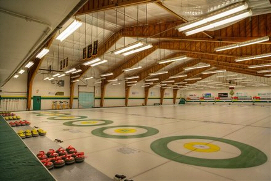 Recently, I spoke about mental toughness to approximately 50 parents, coaches, and youth at the Highland Golf and Curling Club in London, Ontario before participating on a panel to help parents explore and understand competitive issues confronting young athletes.
Recently, I spoke about mental toughness to approximately 50 parents, coaches, and youth at the Highland Golf and Curling Club in London, Ontario before participating on a panel to help parents explore and understand competitive issues confronting young athletes.
I was truly impressed with parents’ commitment to providing the best support to enable their kids to reach their full potential, both as athletes and people. We talked about the value of mental toughness training, and I assured them that using this approach leads to happier children and happier families. Kids who learn how to become mentally tough grow up to be very capable of handling whatever the world throws at them, in sports, school or everyday life.
I look forward to sharing my advice more broadly in the coming months in this blog, through my parent seminars and in an upcoming book aimed at the families of talented, driven youth. Sign up for my mailing list here to be kept informed of seminar dates and other news.
In the meantime, don’t hesitate to reach out with questions. Join the discussion on Facebook and Twitter.
You can learn more about mental toughness training and common issues parents of elite performers face at mentaltoughnesstraining.com
![]()